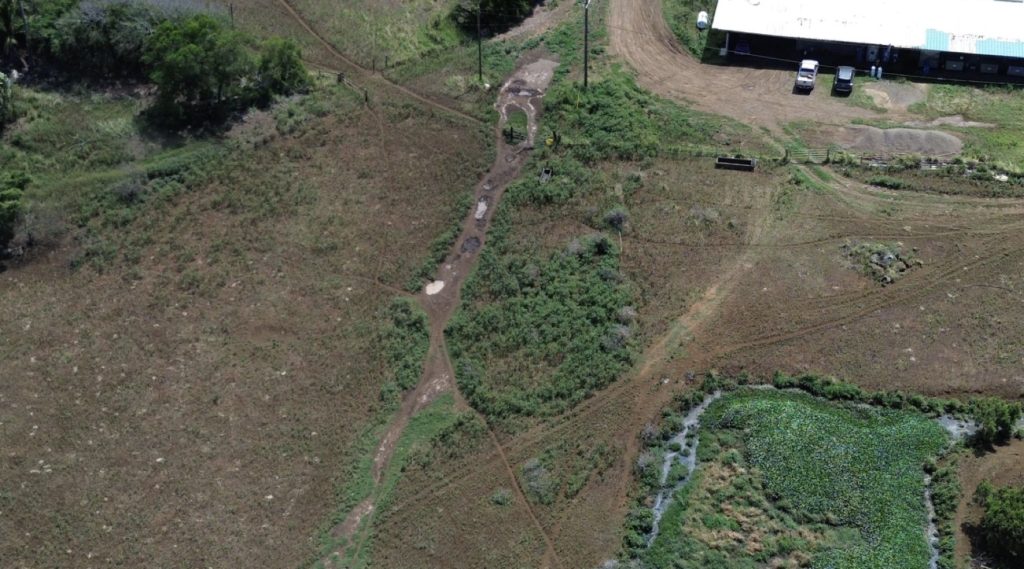Hawai‘i’s only commercial dairy farm faces potential lawsuit for alleged milk, manure discharge into Big Island’s waterways
A national nonprofit announced its intent to sue Hawaiʻi’s only commercial dairy farm, located on the Big Island, based on allegations of discharging milk and manure into the Pacific Ocean.
On Aug. 9, the law offices of Charles Tebbutt, representing the Center for Food Safety, sent a letter saying it intends to initiate a citizen’s suit in Hawaiʻi Federal District Court against Cloverleaf Dairy in Hawi, which is owned by Boteilho Hawai‘i Enterprises.
The letter accuses the dairy company of unlawful dumping at the farm, which is polluting streams, groundwater and ocean waters in violation of the Clean Water Act and Resource Conservation and Recovery Act.

The letter is also addressed to Meadow Gold Dairies, which buys milk from the farm, and Bahman Sadeghi, who is president of Meadow Gold and a primary shareholder of Boteilho Hawai‘i Enterprises.
Sadeghi said the letter he received from Tebbutt’s office is “riddled” with false statements and he intends to fight the impending lawsuit.
“We’ve never discharged into waterways,” Sadeghi said, adding there is no daily discharge of milk or manure byproducts.
About three to four times a year, he said, there will be discharge when the 5,000-gallon tanker, that holds the milk, rejects the product because the temperature is high or titratable acidity is high and doesn’t meet quality requirements.
The 900-acre dairy farm, located 50 miles north of Kona, has operated since 1962 and now is home to 350 milking cows and and additional 500 calves, heifers and dry cows located on three other parcels, some in the neighboring community of Pa’auilo.
The farm produces 2,000 gallons of milk per day. It is the only commercial dairy in the state, according to the state Department of Agriculture.
Sadeghi said he also owns an adjacent parcel of approximately 450 acres that the dairy uses.
Those named in the letter have 60 days to respond to and become compliant with the Clean Water Act.
According to the letter, Tebbutt claims Cloverleaf Dairy has improperly discharged liquid and solid animal waste, wastewater, process water, wastewater, debris, sediment, deceased cows or parts, milk waste and chemicals since at least 2019.
If found in violation, Cloverleaf Dairy, Boteilho Enterprises, Meadow Gold and Sadeghi could be subject to a daily penalty of up to $66,712 per day, per violation listed in the potential lawsuit.
“The problems they need to fix are probably more than they can do in 60 days,” Tebbutt said. “Problems don’t go away by waving a magic wand. They have to show they can fix the problem and discontinue what they’ve been doing.”
Tebbutt confirmed Meadow Gold has responded to his office regarding the letter, however, he wouldn’t go into detail about what’s been discussed, saying: “It’s a privileged discussion at this time.”
The Washington, D.C.-based Center for Food Safety, with offices also in California and Oregon, is an organization committed to “empowering people, supporting farmers and protecting the earth from harmful impacts of industrial agriculture,” according to its website.
The letter includes various pictures of milk that look like a stream flowing through pastureland and photos of dead cows in an open field. Tebbutt would not disclose where the photos came from.
According to the letter, all of Cloverleaf Dairy’s lagoons are earthen and leak manure-related pollutants, “including but not limited to bacteria, nitrates, other nitrogen compounds, and phosphorus, into the soils, which then reach groundwater and move off-site and eventually discharge to the Pacific Ocean.”
Sadeghi confirmed the farm has two lagoons. He explained the discharge goes to solids settling cells and the affluent go into one lined lagoon and one earthen, clay-lined lagoon.
Cows are buried at the property. Sadeghi said a couple of cows die every month.
Sadeghi said he believes the photo of dead animals was a moment of opportunity as it is rare that deceased animals are left out in the open for long periods of time.
The letter said Cloverleaf Dairy needs a valid National Pollutant Discharge Elimination System permit for the discharge and doesnʻt have one, Sadeghi said the company is not required to have that permit, explaining the farm is not designated as a confined animal feeding operation or CAFO.
A large CAFO is defined as having 1,000 cattle or cows, which would require a permit, according to the U.S. Environmental Protection Agency.
A medium CAFO, defined as having 300 to 999 cattle or cows, would require a permit if an operation is found to be a significant contributor of pollutants, the federal agency explains.









